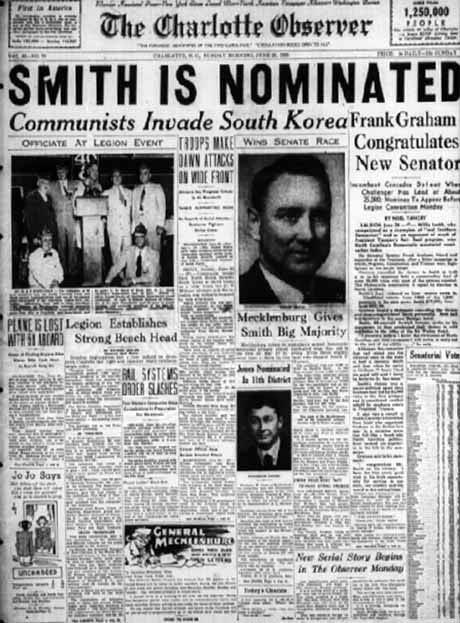The war has ended but unrest at home is just beginning. Visit this decade marked by the entrance of rock 'n roll and desegregation. Read about the infamous US Supreme Court Case, Brown vs. Topeka Board of Education, which outlaws school segregation by race. Watch and listen to Dorothy Counts' emotional experiences at Harding High School.
June 25, 1950 - The Korean War starts.
October 15, 1951 - I Love Lucy premieres on CBS.
May 17, 1954 - US Supreme Court outlaws school segregation.
1955 - Three black students enter UNC Chapel Hill as undergraduates by order of a federal judge.
1956 - Platters, “My Prayer”: First song by an African American group to hit number one on the pop charts
January 5, 1956 - Interstate buses are desegregated.
September 9, 1956 - Elvis on Ed Sullivan: Elvis Presley’s appearance on the Ed Sullivan Show attracts a record audience even though he is shown only from the waist up. His hit "That’s All Right, Mama" combines country music sounds with black rhythm-and-blues.
August 29, 1957- Congress passes the Civil Rights Act of 1957, the first legislation of that type in 82 years. Senator Strom Thurmond of South Carolina sets a record for delaying the bill by speaking on the Senate floor for more than 24 continuous hours. The South is determined to resist the push for equal rights for black Americans. However, later laws would make unlawful the artificial restraints that southern states had created to prevent African Americans from voting.
September 4, 1957 - The National Guard enters Little Rock to stop desegregation. The governor of Arkansas sends the state National Guard into Little Rock to stop the desegregation of schools. The nine black children trying to attend school are threatened by mobs. Later in September, President Eisenhower sends troops to Little Rock to enforce integration.
March 11, 1959 - Raisin in the Sun becomes the first play by a black American to be performed on Broadway.
May 18, 1959 - Wilbert Harrison's "Kansas City" is number one on the pop charts.
